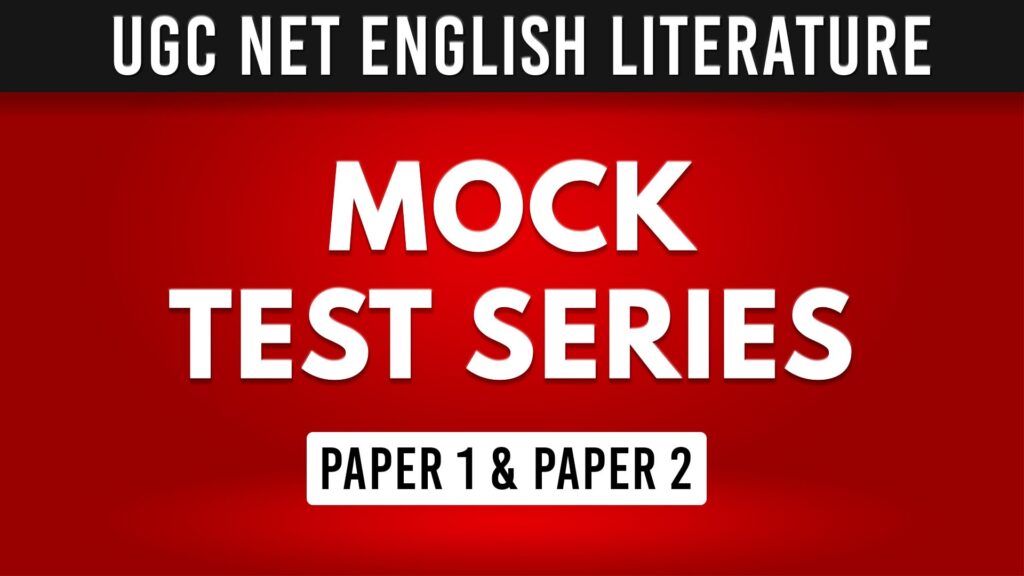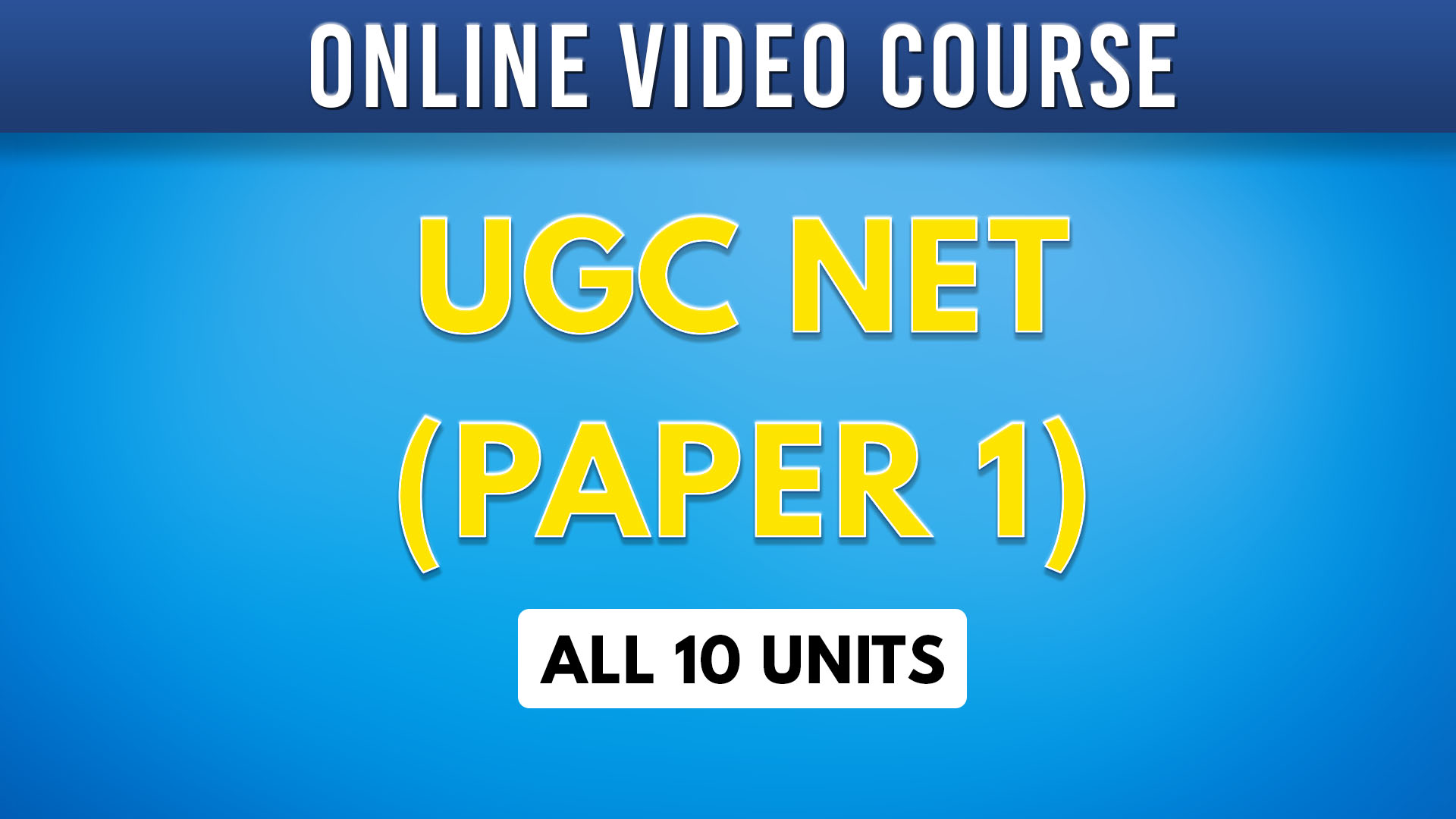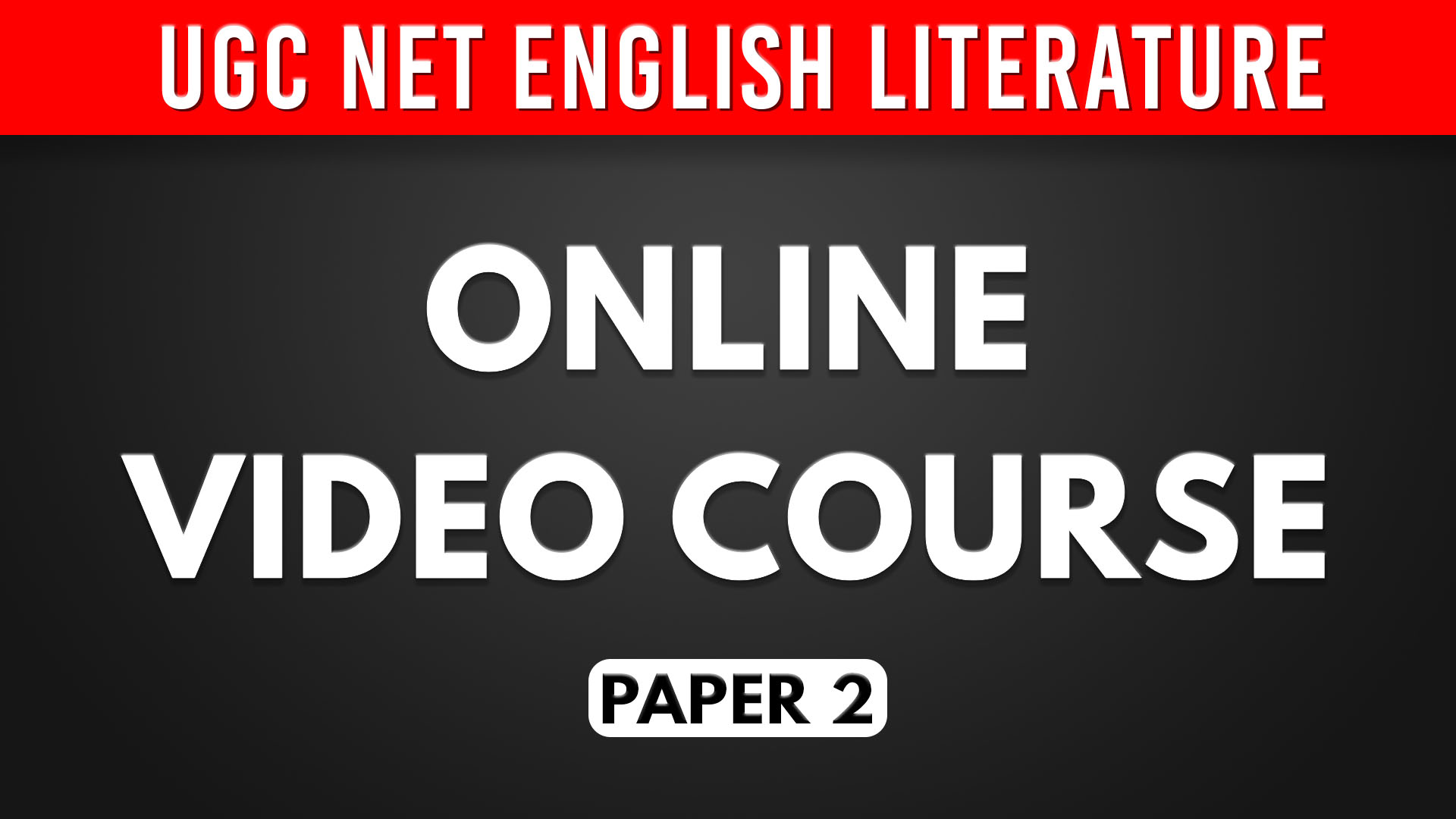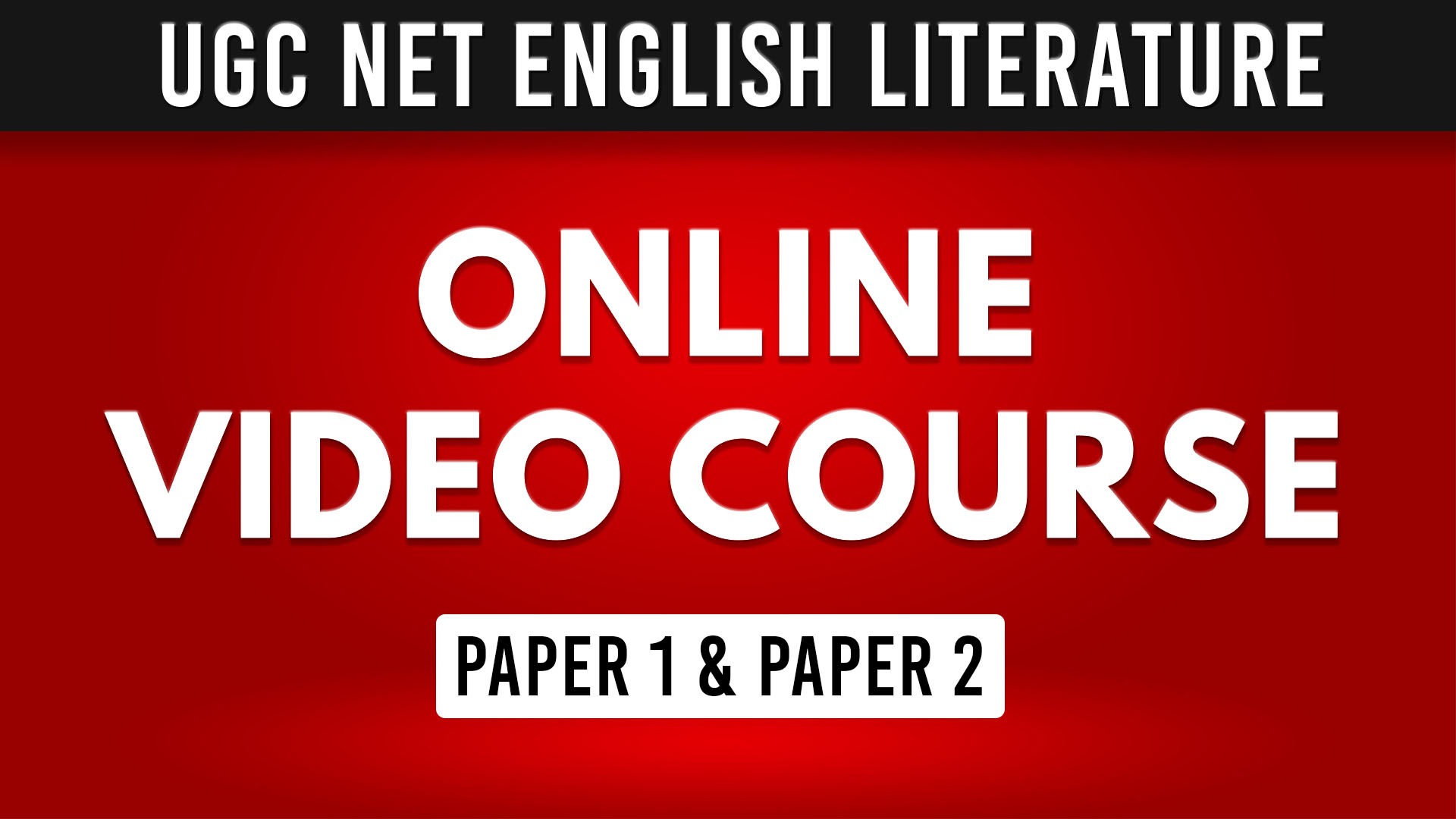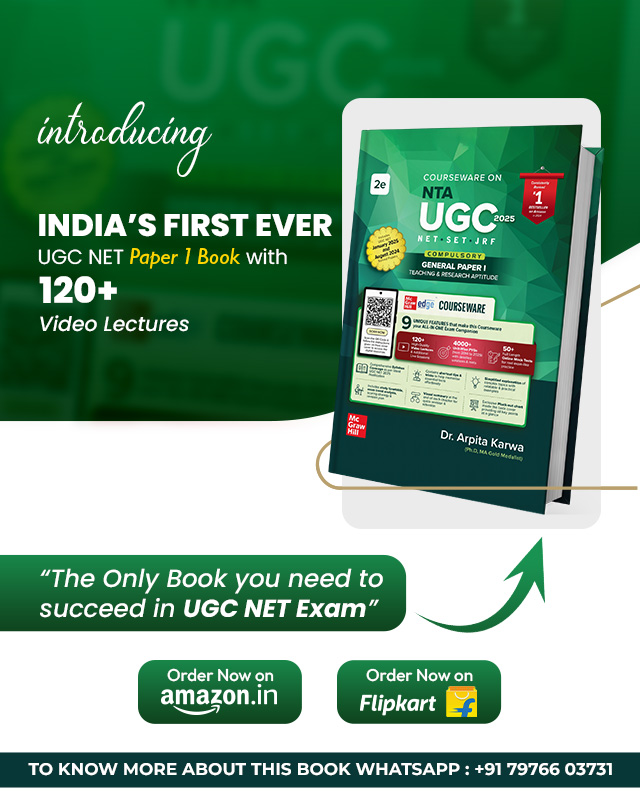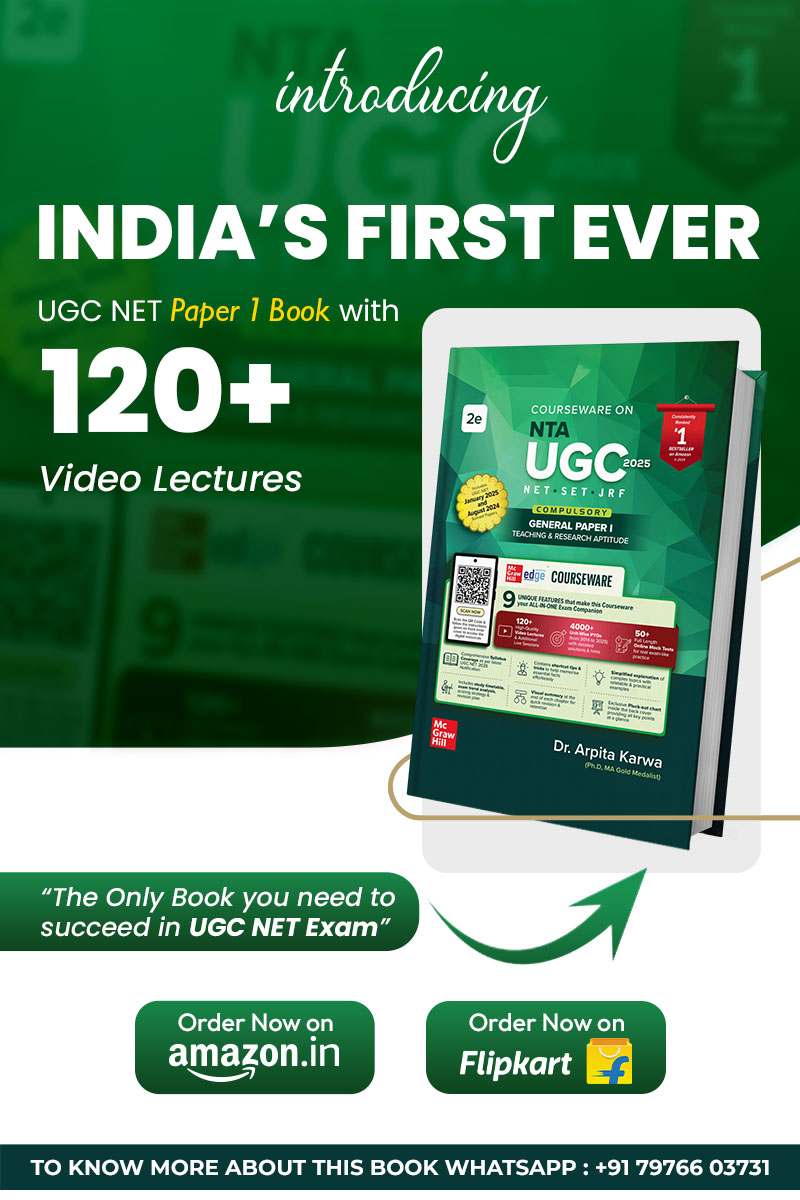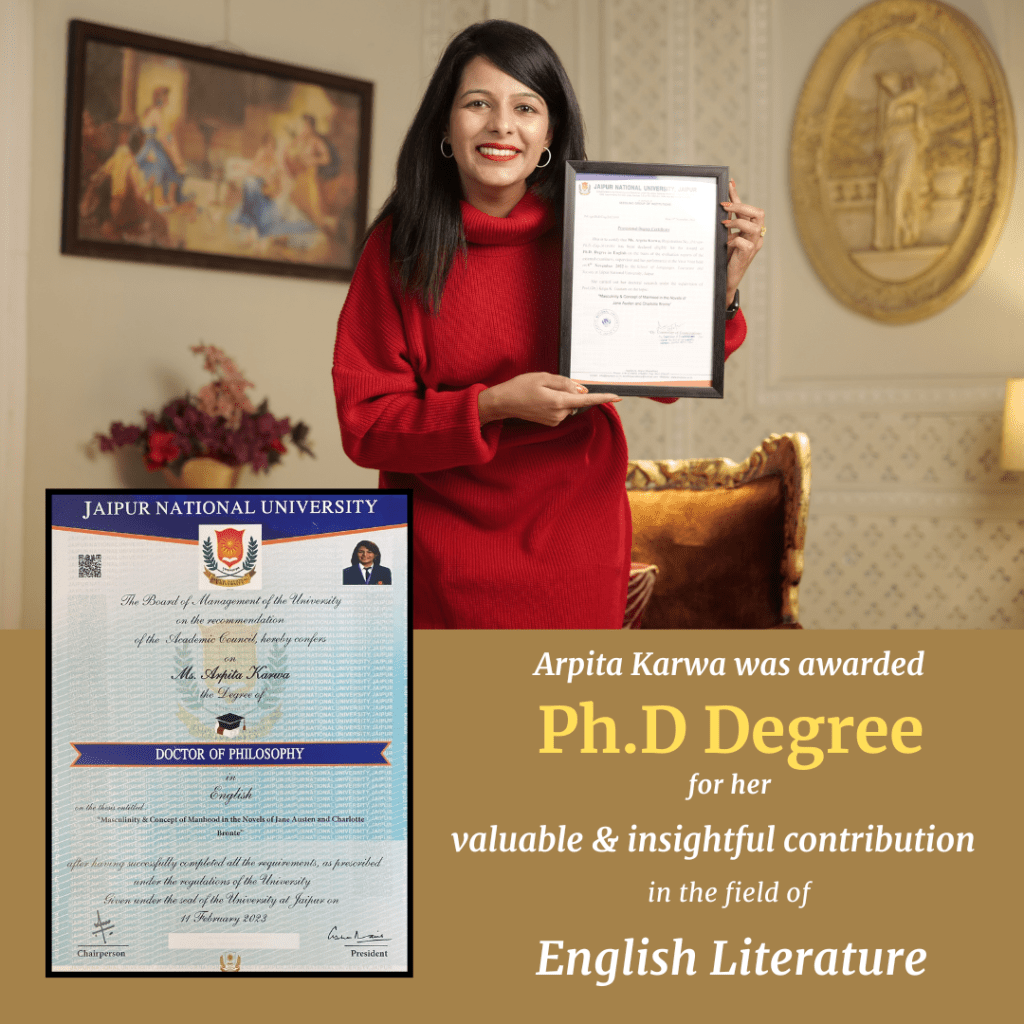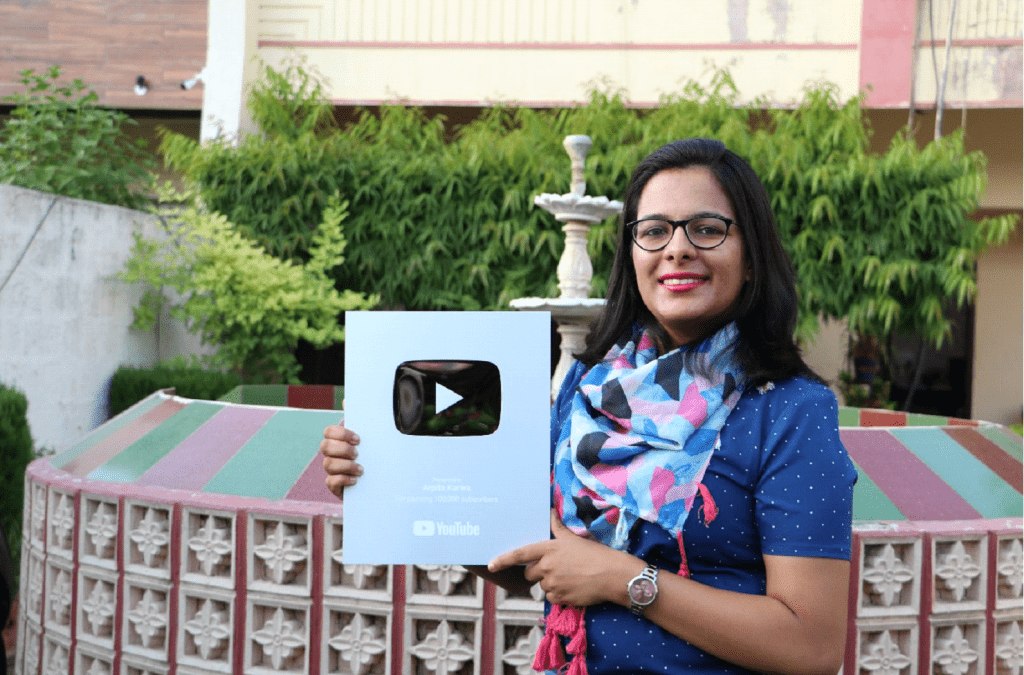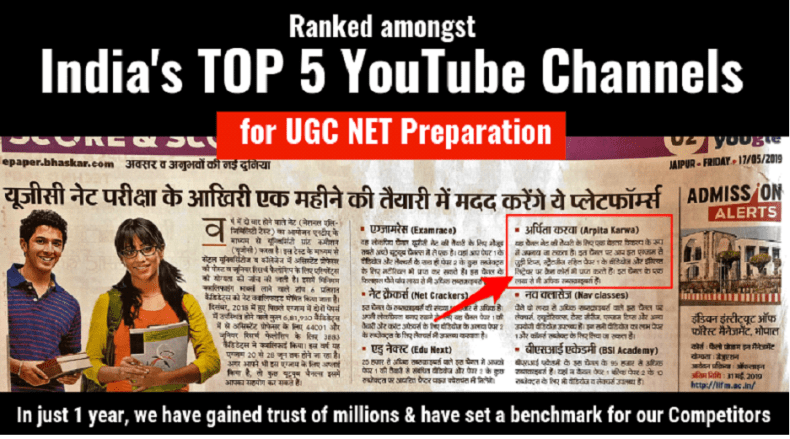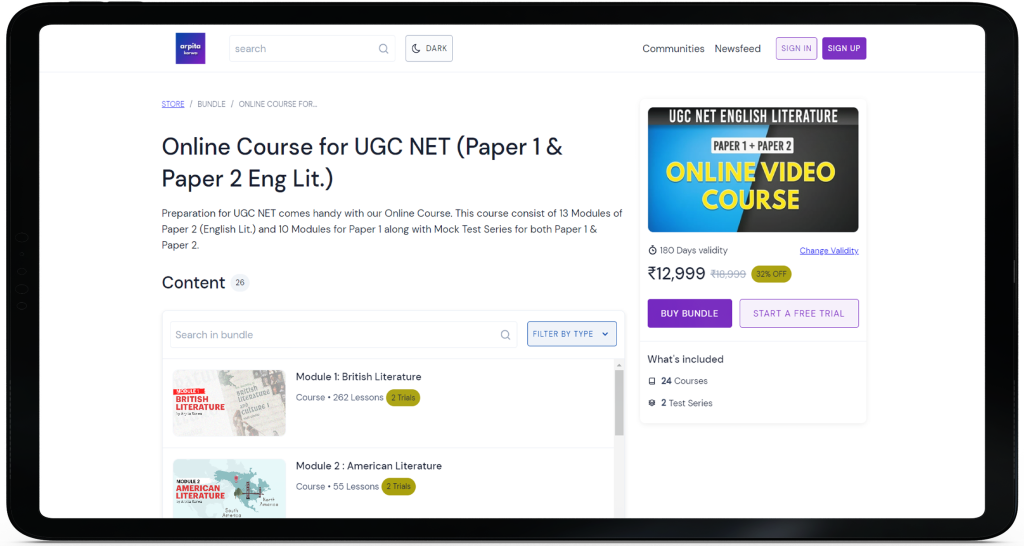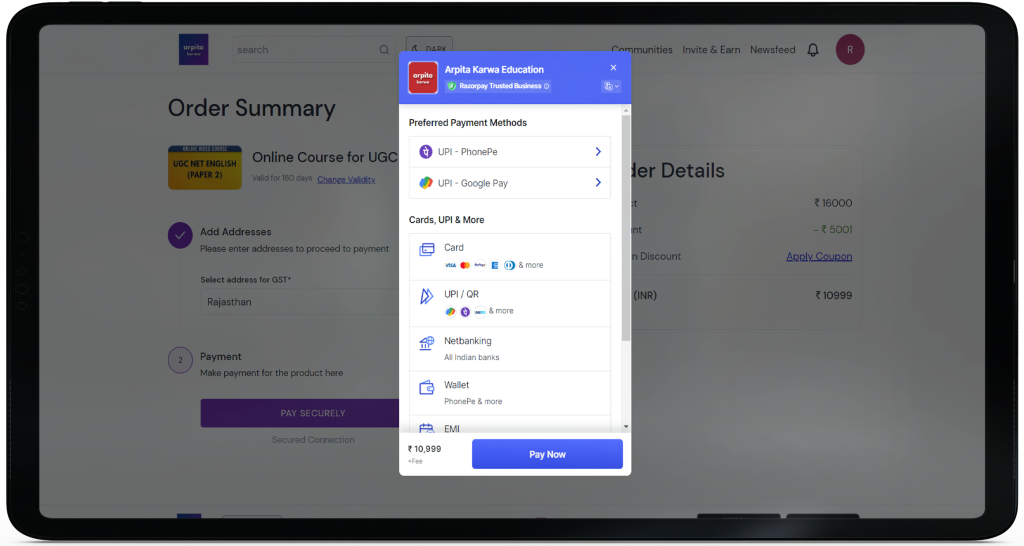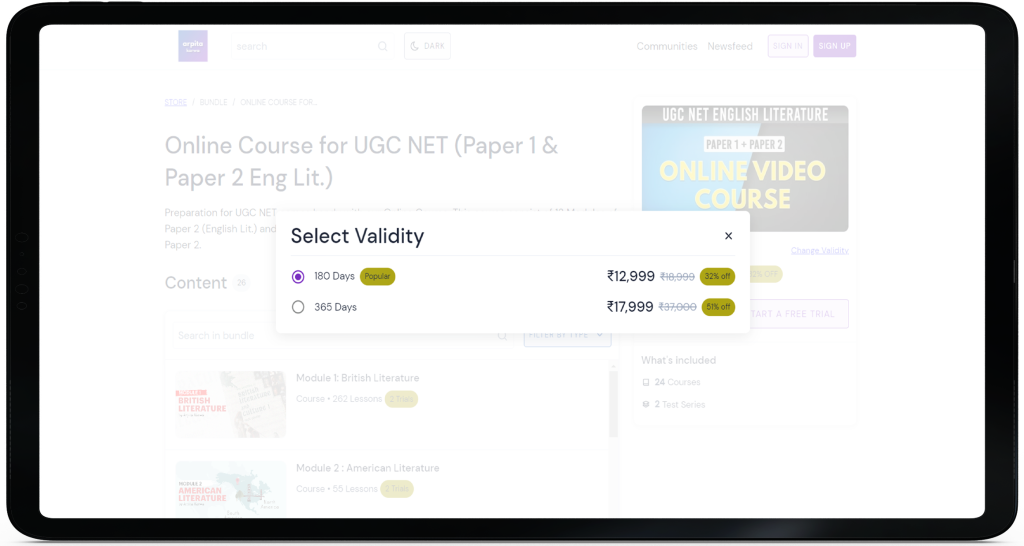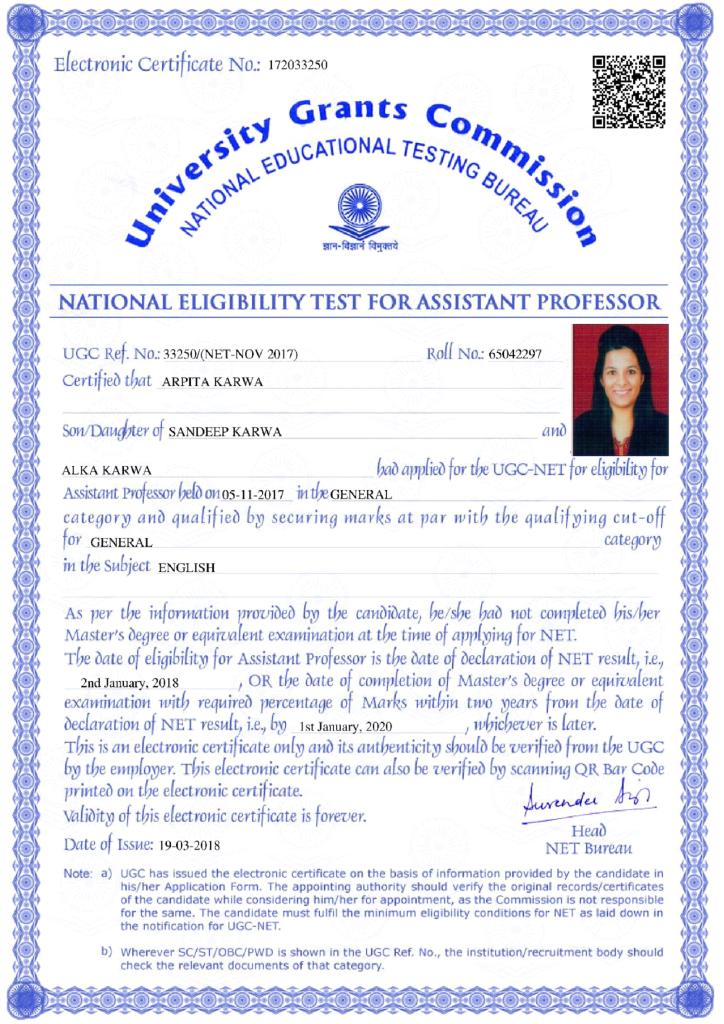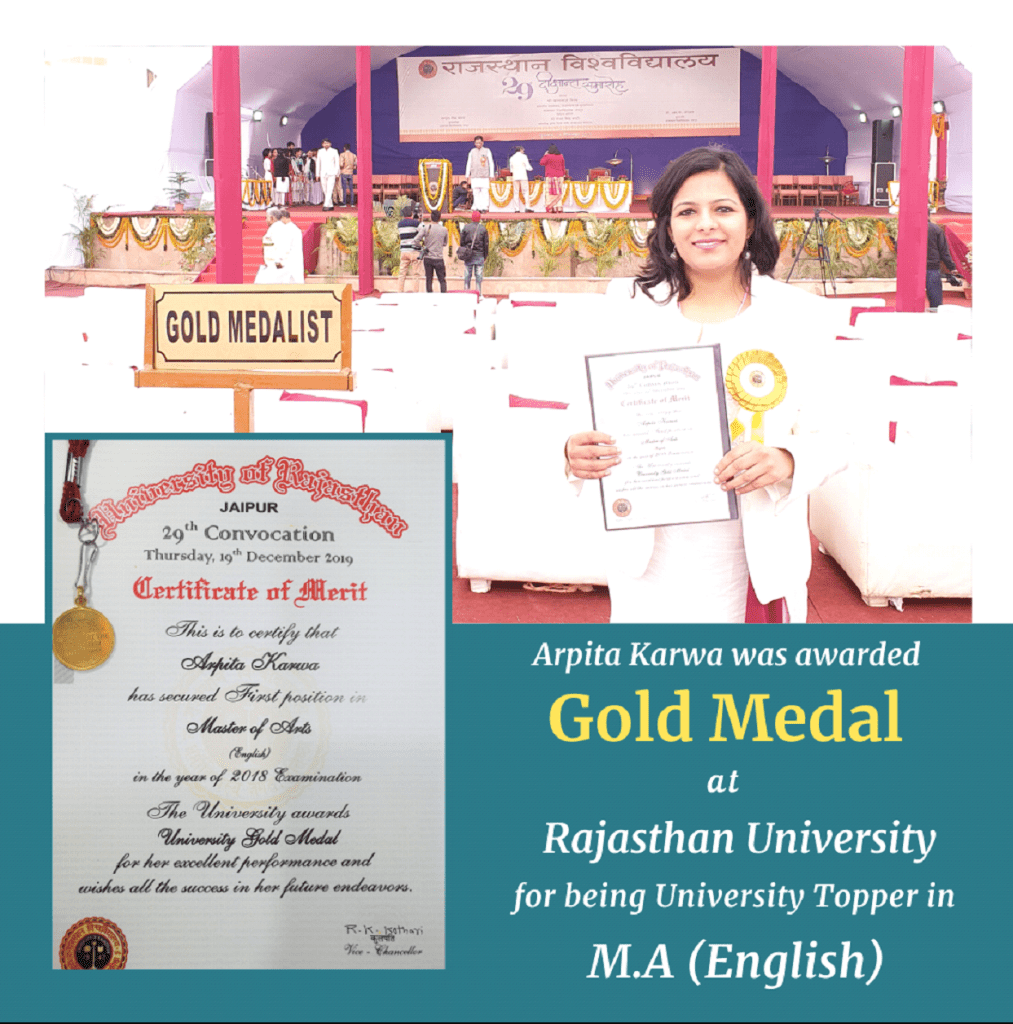UGC Net Paper 1 & 2 Mock Test
March 14, 2023 2024-03-19 12:56UGC Net Paper 1 & 2 Mock Test
UGC NET Paper 1 & 2 Mock Test
Practicing Mock Tests regularly is a crucial part of qualifying any competitive exam, including UGC NET in English Literature. We bring you our UGC NET Paper 1 & Paper 2 Mock Test Series, prepared by our expert panel according to the latest UGC NET Paper 1 & Paper 2 Syllabus. Our Test Series contains not just the questions and answers but also will provide you with a detailed performance report and feedback. Purchase now itself!
1100 +
Students Enrolled
4.8
Average Rating
3000+
Mock Test Questions
English
Language of Instruction
Demo Material
Video Lectures
PDFs
Types of Variable
Unit 02 : Research Aptitude
Types of Network
Unit 07 : Information & Computer Technology
Institutions of Education in Ancient India & Decline of Ancient Education
Module 09 : Higher Education
Features of This Course
Best quality video lectures
360 Degree Syllabus Coverage
High-quality PDFs & revision notes
Mock Tests series as per latest exam pattern
Course Description
Our UGC NET Paper 1 & Paper 2 Mock Test Series brings to you top quality questions and answers prepared by experts based on the latest syllabus of UGC NET Paper 1 & Paper 2 English. Our test series consists of highly repeated and top quality questions. We regularly examine our questions to make sure they remain pertinent to the most recent questions, trends, and changes in exam format of UGC NET Paper 1 & Paper 2 English exam. Along with taking the tests regularly, it is important for the students to understand their performance level, and their strong and weak areas. For this purpose, we provide the students with detailed performance reports to find areas where there is scope for improvement. After each test you will notice significant improvement in your conceptual understanding and test taking abilities, we promise. We also provide topic wise tests for both UGC NET Paper 1 and Paper 2. All the mock tests are conducted in the same way as in the actual exam, which aids in better time management and equips students to correctly answer multiple-choice questions under pressure. This enables the students to understand the exact amount of time to devote to comprehending a question completely and attempting it. Purchase our UGC NET Paper 1 & Paper 2 Mock Test Series today, and witness the drastic improvement in your scores Enroll Now.
Pricing

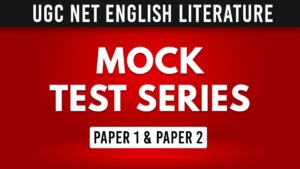
UGC NET Paper 1 & 2 Mock Test - Everything You Need for Your Exam Preparation
Course Syllabus
- Module 01 – Teaching Aptitude
- Module 02 – Research Aptitude
- Module 03 – Communication
- Module 04 – Logical Reasoning
- Module 05 – Mathematical Aptitude
- Module 06 – Data Interpretation
- Module 07 – Information & Communication Technology
- Module 08 – People & Environment
- Module 09 – Higher Education
- Module 10 – Reading Comprehension
- Lesson 01 - Introduction
- Lesson 02 - Objectives of Teaching
- Lesson 03 - Nature & Characteristics of Teaching
- Lesson 04 - Characteristics Of Good Teacher (Part 1)
- Lesson 05 - Characteristics Of Good Teacher (Part 2)
- Lesson 06 - Factors Affecting Effectiveness of Teaching
- Lesson 07 - Levels of Teaching
- Lesson 08 - What is Learning?
- Lesson 09 - Domains of Learning
- Lesson 10 - Learner's Characteristics
- Lesson 11 - Classroom Communication
- Lesson 12 - Teaching Process
- Lesson 13 - Methods of Teaching
- Lesson 14 - E-Learning Facilities
- Lesson 15 - Teaching Aids
- Lesson 16 - Evaluation System
- Lesson 17 - New Modes of Learning
- Lesson 18 - Learning Disorders
- Lesson 19 - Teacher’s Role in Higher Education School
- Lesson 20 - Syllabus vs Curriculum
- Lesson 01 - Introduction
- Lesson 02 - Objectives & Characteristics of Research
- Lesson 03 - Types of Research (Part 1)
- Lesson 04 - Types of Research (Part 2)
- Lesson 05 - Types of Research (Part 3)
- Lesson 06 - Steps in Research Process
- Lesson 07 - Objectives & Research Design
- Lesson 08 - Variables
- Lesson 09 - Types of Variables
- Lesson 10 - Hypothesis
- Lesson 11 - Sampling
- Lesson 12 - Probability Sampling
- Lesson 13 - Non Probability Sampling
- Lesson 14 - Tools of Data Collection
- Lesson 15 - Data Analysis & Representation
- Lesson 16 - Hypothesis Testing
- Lesson 17 - Seminars, Conferences , Workshop & Symposiums
- Lesson 18 - Thesis Writing Format
- Lesson 19 - Citation
- Lesson 20 - Research Ethics
- Lesson 01 - Introduction
- Lesson 02 - Process of Communication (Part 1)
- Lesson 03 - Process of Communication (Part 2)
- Lesson 04 - Characteristics of Communication
- Lesson 05 - Types of Communication (Part 1)
- Lesson 06 - Types of Communication (Part 2)
- Lesson 07 - Types of Communication (Part 3)
- Lesson 08 - Barriers to Communication (Part 1)
- Lesson 09 - Barriers to Communication (Part 2)
- Lesson 10 - Effective Communication
- Lesson 11 - Classroom Communication (Part 1)
- Lesson 12 - Classroom Communication (Part 2)
- Lesson 13 - Mass Communication
- Lesson 14 - Types of Mass Communication: Films & Television
- Lesson 15 - Types of Mass Communication: Radio
- Lesson 16 - Types of Mass Communication: Press & Print Media
- Lesson 17 - Traditional Media & New Media
- Lesson 18 - Commonly Asked Definitions
- Lesson 19 - Commonly Asked Terminologies
- Lesson 20 - Important Concepts Related to Communication
- Lesson 01 - Introduction
- Lesson 02 - Meaning of an Argument
- Lesson 03 - Types of Argument (1)
- Lesson 04 - Conditions (1)
- Lesson 05 - Conditions (2)
- Lesson 06 - Questions of Arguments
- Lesson 07 - Types of Arguments (2)
- Lesson 08 - Types of Arguments (3)
- Lesson 09 - Syllogism, The Logical Way (1)
- Lesson 10 - Syllogism, The Logical Way (2)
- Lesson 11 - Syllogism, The Short Trick
- Lesson 12 - The History of LOGIC
- Lesson 13 - The Squares of Opposition
- Lesson 14 - PYPQ
- Lesson 01 - Introduction
- Lesson 02 - Series (Part 1: Number Series)
- Lesson 03 - Series (Part 2: Number Series)
- Lesson 04 - Series (Part 3.1 : Number Series)
- Lesson 05 - Series (Part 3.2 : Letter Series)
- Lesson 06 - Blood Relations
- Lesson 07 - Direction
- Lesson 08 - Coding Decoding
- Lesson 09 - Average
- Lesson 10 - Age Related Problems
- Lesson 11 - Venn Diagram
- Lesson 12 - Percentage
- Lesson 13 - Profit And Loss
- Lesson 14 - Ratio And Proportions
- Lesson 15 - Attempting Questions
- Lesson 01 - Introduction
- Lesson 02 - Generation & Types of Computers
- Lesson 03 - Components of Computer & Input Devices
- Lesson 04 - Output Devices
- Lesson 05 - Central Processing Unit & Memory
- Lesson 06 - Binary to Decimal & Decimal to Binary Conversion
- Lesson 07 - Hardware & Software
- Lesson 08 - Programming Languages
- Lesson 09 - What is Network
- Lesson 10 - Network Devices
- Lesson 11 - Types of Network
- Lesson 12 - Internet
- Lesson 13 - Preparing Computer for Internet Service
- Lesson 14 - Popular Web Browsing Software & Search Engine
- Lesson 15 - Software Requirement for Internet + Domain Name
- Lesson 16 - Intranet & Extranet
- Lesson 17 - Email
- Lesson 18 - Audio & Video Conferencing
- Lesson 19 - Role of ICT in Higher Education
- Lesson 20 - Role of ICT in Governance
- Lesson 01 - Introduction
- Lesson 02 - Generation & Types of Computers
- Lesson 03 - Components of Computer & Input Devices
- Lesson 04 - Output Devices
- Lesson 05 - Central Processing Unit & Memory
- Lesson 06 - Binary to Decimal & Decimal to Binary Conversion
- Lesson 07 - Hardware & Software
- Lesson 08 - Programming Languages
- Lesson 09 - What is Network
- Lesson 10 - Network Devices
- Lesson 11 - Types of Network
- Lesson 12 - Internet
- Lesson 13 - Preparing Computer for Internet Service
- Lesson 14 - Popular Web Browsing Software & Search Engine
- Lesson 15 - Software Requirement for Internet + Domain Name
- Lesson 16 - Intranet & Extranet
- Lesson 17 - Email
- Lesson 18 - Audio & Video Conferencing
- Lesson 19 - Role of ICT in Higher Education
- Lesson 20 - Role of ICT in Governance
- Lesson 01 - People, Development and Environment
- Lesson 02 - Components of Environment
- Lesson 03 - Environmental Issues
- Lesson 04 - Ecology, Ecosystem & Types of Ecosystem
- Lesson 05 - Structure of Ecosystem
- Lesson 06 - Trophic Levels and Ecological Pyramid
- Lesson 07 - Biodiversity and Biosphere Reserve
- Lesson 08 - Climate Change
- Lesson 09 - Pollution, Pollutants and their Impact on Human Life
- Lesson 10 - Waste
- Lesson 11 - UN Millenium Development Goals
- Lesson 12 - Natural Resources
- Lesson 13 - Renewable Energy (Part 1)
- Lesson 14 - Renewable Energy (Part 2)
- Lesson 15 - Hazard and Disaster
- Lesson 16 - Earthquake, Tsunami & Volcano
- Lesson 17 - Cyclone, Flood & Drought
- Lesson 18 - Landslide and Avalanches
- Lesson 19 - International Environmental Agreement (NAPCC to NMSKCC)
- Lesson 20 - International Environmental Agreement
- Lesson 21 - Environment Protect Act
- Lesson 01 - Introduction
- Lesson 02 - Institutions of Education in Ancient India & Decline
- Lesson 03 - Evolution of Higher Learning in India (Pre)
- Lesson 04 - Evolution of Higher Learning in India (Post)
- Lesson 05 - Structure of Institutions of Higher Education (Policy)
- Lesson 06 - Structure of Institutions of Higher Education
- Lesson 07 - Accreditations
- Lesson 08 - Universities
- Lesson 09 - Non-Conventional Education (IGNOU)
- Lesson 10 - Commonwealth of Learning and NIRF
- Lesson 11 - Professional Education
- Lesson 12 - Technical Education
- Lesson 13 - Skill Development
- Lesson 14 - Components of Indian Education System
- Lesson 15 - Value Education and Environmental Education
- Lesson 16 - Major Problems in Higher Education in India
- Lesson 17 - Key Trends in Higher Education System in India
- Lesson 18 - Government Initiatives
- Lesson 19 - Digital Initiatives
- Lesson 20 - Policy, Governance & Administration
Course Syllabus
- Module 01 – British Literature
- Module 02 – American Literature
- Module 03 – Postcolonial Literature
- Module 04 – European Literature
- Module 05 – Indian Literature
- Module 06 – Literary Criticism
- Module 07 – Literary Theory
- Module 08 – Literary Terms & Devices
- Module 09 – Literary Movements
- Module 10 – Linguistics
- Module 11 – English in India
- Module 12 – Cultural Studies
- Module 13 – Research Methodology
- Lesson 01 - Introduction to Age of Revival- Historic Background, Theme, Style
- Lesson 02 - Erasmus
- Lesson 03 - Thomas More
- Lesson 04 - William Tyndale
- Lesson 05 - Richard Tottel
- Lesson 06 - Thomas Wyatt
- Lesson 07 - Henry Howard
- Lesson 08 - Roger Ascham
- Lesson 09 - Thomas Elyot
- Lesson 10 - Thomas Malory
- Lesson 11 - William Dunbar
- Lesson 01 - Introduction to Elizabethan Age- Historic Background, Theme, Style
- Lesson 02 - Popular Bible Translations
- Lesson 03 - Edmund Spenser
- Lesson 04 - Thomas Sackville
- Lesson 05 - Philip Sidney
- Lesson 06 - Michael Drayton
- Lesson 02 - Alexander Pope
- Lesson 03 - Jonathan Swift
- Lesson 04 - Richard Steele
- Lesson 05 - Joseph Addison
- Lesson 06 - Samuel Johnson
- Lesson 07 - Daniel Defoe
- Lesson 08 - Henry Fieldings
- Lesson 09 - Samuel Richardson
- Lesson 10 - Tobias Smolett
- Lesson 11 - Laurence Sterne
- Lesson 12 - Charlotte Lennox
- Lesson 13 - Thomas Gray
- Lesson 14 - Oliver Goldsmith
- Lesson 15 - William Cowper
- Lesson 16 - Robert Burns
- Lesson 17 - William Blake
- Lesson 18 - James Thomson
- Lesson 19 - William Collins
- Lesson 20 - George Crabbe
- Lesson 21 - James Macpherson
- Lesson 22 - Thomas Chatterton
- Lesson 23 - Thomas Percy
- Lesson 24 - John Stagg
- Lesson 02 - Alfred Lord Tennyson
- Lesson 03 - Robert Browning
- Lesson 04 - Elizabeth Barret Browning
- Lesson 05 - Dante Gabriel Rossetti
- Lesson 06 - Christina Rossetti
- Lesson 07 - William Morris
- Lesson 08 - A.C Swinburne
- Lesson 09 - G.M Hopkins
- Lesson 10 - Edward Fitzgerald
- Lesson 11 - Charles Dickens
- Lesson 12 - William Makepeace Thackrey
- Lesson 13 - George Eliot
- Lesson 14 - Charles Reade
- Lesson 15 - Anthony Trollope
- Lesson 16 - Charlotte Bronte
- Lesson 17 - Emily Bronte
- Lesson 18 - Anne Bronte
- Lesson 19 - Bulwer Lyton
- Lesson 20 - Charles Kingsley
- Lesson 21 - Elizabeth Gaskell
- Lesson 22 - R.D Blackmore
- Lesson 23 - George Meredith
- Lesson 24 - Thomas Hardy
- Lesson 25 - R.L Stevenson
- Lesson 26 - Lewis Carroll
- Lesson 27 - William Wilkie Collins
- Lesson 28 - Arthur Conan Doyle
- Lesson 02 - Joseph Conrad
- Lesson 03 - George Orwell
- Lesson 04 - James Joyce
- Lesson 05 - Virginia Woolf
- Lesson 06 - D.H Lawrence
- Lesson 07 - Aldous Huxley
- Lesson 08 - Graham Greene
- Lesson 09 - E.M Foster
- Lesson 10 - Ford Madox Ford
- Lesson 11 - Arnold Bennett
- Lesson 12 - H.G Wells
- Lesson 13 - J.M Barrie
- Lesson 14 - Rudyard Kipling
- Lesson 15 - Samuel Butler
- Lesson 02 - Agatha Christie
- Lesson 03 - Jeanette Winterson
- Lesson 04 - J.R.R Tolkien
- Lesson 05 - Bram Stoker
- Lesson 06 - Christopher Isherwood
- Lesson 07 - Bertrand Russell
- Lesson 08 - J.M Priestley
- Lesson 09 - Somerset Maugham
- Lesson 10 - Doris Lessing
- Lesson 11 - J.K Rowling
- Lesson 12 - William Goldings
- Lesson 13 - Ian McEwan
- Lesson 14 - Lawrence Durrell
- Lesson 15 - Graham Swift
- Lesson 16 - Martin Amis
- Lesson 17 - Kingsley Amis
- Lesson 18 - Iris Murdoch
- Lesson 19 - John Fowles
- Lesson 20 - Muriel Spark
- Lesson 21 - A.S Byatt
- Lesson 22 - Malcolm Bradbury
- Lesson 23 - Angela Carter
- Lesson 24 - Patrick Kavanagh
- Lesson 25 - J.P Donleavey
- Lesson 26 - Anthony Powell
- Lesson 27 - David Storey
- Lesson 28 - Joyce Cary
- Lesson 29 - Angus Wilson
- Lesson 30 - Anthony Burgess
- Lesson 31 - Peter Ackroyd
- Lesson 32 - Alan Bennett
- Lesson 33 - Noel Coward
- Lesson 34 - Christopher Fry
- Lesson 35 - Harold Pinter
- Lesson 36 - Samuel Beckett
- Lesson 37 - Edward Bond
- Lesson 38 - Tom Stoppard
- Lesson 39 - Terence Rattigan
- Lesson 40 - Arnold Wesker
- Lesson 41 - John Osborne
- Lesson 42 - Caryl Churchill
- Lesson 43 - Joe Orton
- Lesson 01 - Fredrick Douglass
- Lesson 02 - Harriet Beecher Stowe
- Lesson 03 - Herman Melville
- Lesson 04 - James Cooper
- Lesson 05 - Louisa May Alcott
- Lesson 06 - Nathaniel Hawthorne
- Lesson 07 - Edgar Allen Poe
- Lesson 08 - Ralph Waldo Emerson
- Lesson 09 - Henry David Thoreau
- Lesson 10 - Washington Erving
- Lesson 11 - Emily Dickinson
- Lesson 12 - Walt Whitman
- Lesson 13 - William Cullen Bryant
- Lesson 01 - William Faulkner
- Lesson 02 - Ernest Hemingway
- Lesson 03 - F. Scott Fitzgerald
- Lesson 04 - Gertrude Stein
- Lesson 05 - Sinclair Lewis
- Lesson 06 - Tennessee Williams
- Lesson 07 - Arthur Miller
- Lesson 08 - Eugene O Neill
- Lesson 09 - Susan Glaspell
- Lesson 10 - Robert Frost
- Lesson 11 - Wallace Stevens
- Lesson 12 - Ezra Pound
- Lesson 13 - H.D
- Lesson 14 - William Carlos William
- Lesson 15 - E.E Cummings
- Lesson 01 - John Updike
- Lesson 02 - Harper Lee
- Lesson 03 - Truman Capote
- Lesson 04 - J.D Salinger
- Lesson 05 - John O Hara
- Lesson 06 - John Steinbeck
- Lesson 07 - Joseph Heller
- Lesson 08 - William S Burroughs
- Lesson 09 - Jack Kerouac
- Lesson 10 - Edward Albee
- Lesson 11 - Saul Bellow
- Lesson 12 - Ray Bradbury
- Lesson 13 - Allen Ginsberg
- Lesson 14 - Anne Sexton
- Lesson 15 - Sylvia Plath
- Lesson 16 - Robert Lowell
- Lesson 17 - Elizabeth Bishop
- Lesson 01 - Michael Ondaatje
- Lesson 02 - Margaret Atwood
- Lesson 03 - Nadine Gordimer
- Lesson 03 - Yann Martel
- Lesson 04 - Alice Munro
- Lesson 05 - Lawrence Hill
- Lesson 06 - Rohinton Mistry
- Lesson 07 - Margaret Lawrence
- Lesson 08 - Gabrielle Roy
- Lesson 09 - Shyam Selvadurai
- Lesson 10 - Maria Campbell
- Lesson 11 - Sinclair Ross
- Lesson 12 - Thomas King
- Lesson 01 - Montaigne
- Lesson 02 - Moliere
- Lesson 03 - Voltaire
- Lesson 04 - Eugene Ionesco
- Lesson 05 - Gustave Flaubert
- Lesson 06 - Honare De Balzac
- Lesson 07 - Emile Zola
- Lesson 08 - Albert Camus
- Lesson 09 - Marcel Proust
- Lesson 10 - Charles Baudelaire
- Lesson 11 - Guy De Maupassant
- Lesson 12 - Jean Paul Satre
- Lesson 13 - Milan Kundera
- Lesson 14 - Jean Genet
- Lesson 15 - Alexander Dumas
- Lesson 01 - Bankim Chandra Chatterjee
- Lesson 02 - Mulk Raj Anand
- Lesson 03 - R.K Narayan
- Lesson 04 - Raja Rao
- Lesson 05 - Kamala Markandaya
- Lesson 06 - Manohar Malgaonkar
- Lesson 07 - Khushwant Singh
- Lesson 08 - Bharti Mukharjee
- Lesson 09 - Nirad C. Chaudhari
- Lesson 10 - Ruskin Bond
- Lesson 11 - Shashi Deshpande
- Lesson 12 - G.V Desani
- Lesson 13 - U. R. Ananthamurthy
- Lesson 14 - Anita Desai
- Lesson 15 - Kiran Desai
- Lesson 16 - Arun Joshi
- Lesson 17 - Arundhati Roy
- Lesson 18 - Nayantara Sahgal
- Lesson 19 - Jhumpa Lahiri
- Lesson 20 - Amitav Ghosh
- Lesson 01 - Michael Madhusudan Dutt
- Lesson 02 - Toru Dutt
- Lesson 03 - Sri Aurobindo
- Lesson 04 - Sarojini Naidu
- Lesson 05 - Rabindranath Tagore
- Lesson 06 - Kamala Das
- Lesson 07 - A.K Ramanujan
- Lesson 08 - A.K Melhotra
- Lesson 09 - Nissim Ezekiel
- Lesson 10 - Gopi Kattoor
- Lesson 11 - Agha Shahid Ali
- Lesson 12 - Arun Kolatkar
- Lesson 13 - Gieve Patel
- Lesson 14 - Keki Daruwalla
- Lesson 15 - Meena Alexander
- Lesson 16 - Jayant Mahapatra
- Lesson 17 - Mahashweta Devi
- Lesson 18 - Vikram Seth
- Lesson 19 - P.Lal
- Lesson 20 - R. Parthasarathy
- Lesson 01 - Introduction to Indian Aesthetics
- Lesson 02 - Rasa School (Bharat Muni)
- Lesson 03 - Alamkara School (Bhamaha)
- Lesson 04 - Guna Dosa School (Dandin)
- Lesson 05 - Riti School (Vamana)
- Lesson 06 - Dhwani School (Anandvardhana)
- Lesson 07 - Vakroti School (Kuntaka)
- Lesson 08 - Aucitya School (Ksemendra)
- Lesson 01 - What is Feminism?
- Lesson 02 - Mary Wollstonecraft
- Lesson 03 - Margaret Fuller
- Lesson 04 - J.S Mill
- Lesson 05 - Virginia Woolf
- Lesson 06 - Simon De Beauvoir
- Lesson 07 - Kate Millett
- Lesson 08 - Judith Butler
- Lesson 09 - Elaine Showalter
- Lesson 10 - Helene Cixous
- Lesson 11 - Sandra & Susan Gilbert
- Lesson 12 - Shulamith Firestone
- Lesson 01 - What is Postcolonial Criticism?
- Lesson 02 - Franz Fanon
- Lesson 03 - Edward Said
- Lesson 04 - Homi K Bhabha
- Lesson 05 - Gayatri Spivak
- Lesson 06 - Aime Cesaire & Leopold
- Lesson 07 - Edward Soja
- Lesson 08 - Benedict Anderson
- Lesson 09 - Antonio Negri & Michael Hart
- Lesson 10 - Salman Rushdie
- Lesson 11 - Bill Ashcroft
- Lesson 01 - Allegory
- Lesson 02 - Alliteration
- Lesson 03 - Allusion
- Lesson 04 - Anaphora
- Lesson 05 - Antithesis
- Lesson 06 - Apostrophe
- Lesson 07 - Bathos
- Lesson 08 - Conceit
- Lesson 09 - Circumlocution
- Lesson 10 - Chaismus
- Lesson 11 - Diacope
- Lesson 12 - Hyperbole
- Lesson 13 - Imagery
- Lesson 14 - Irony
- Lesson 15 - Juxtaposition
- Lesson 16 - Kenning
- Lesson 17 - Litotes
- Lesson 18 - Metaphor
- Lesson 19 - Metonymy
- Lesson 20 - Onomatopoeia
- Lesson 21 - Oxymoron
- Lesson 22 - Pathetic Fallacy
- Lesson 23 - Paradox
- Lesson 24 - Personification
- Lesson 25 - Prolepsis
- Lesson 26 - Simile
- Lesson 27 - Synecdoche
- Lesson 28 - Synesthesia
- Lesson 29 - Transferred Epithet
- Lesson 30 - Zeugma
- Lesson 01 - Anti Climax
- Lesson 02 - Anti Hero
- Lesson 03 - Byronic Hero
- Lesson 04 - Bowdlerize
- Lesson 05 - Carpe Diem
- Lesson 06 - Celtic Myths
- Lesson 07 - Dream Vision
- Lesson 08 - Deus Ex Machina
- Lesson 09 - Epiphany
- Lesson 10 - Epilogue
- Lesson 11 - Euphemism
- Lesson 12 - Epigraph
- Lesson 13 - Epithet
- Lesson 14 - Epitaph
- Lesson 15 - Incunabula
- Lesson 16 - Motif
- Lesson 17 - Malapropism
- Lesson 18 - Purple Patch
- Lesson 19 - Poetic Licence
- Lesson 20 - Poetic Justice
- Lesson 21 - Poetic Diction
- Lesson 22 - Palinode
- Lesson 23 - Parody
- Lesson 24 - Satire
- Lesson 25 - Soliloquy
- Lesson 01 - Apocalyptic Literature
- Lesson 02 - Bildungsroman
- Lesson 03 - Campus Novel
- Lesson 04 - Chivalric Romance
- Lesson 05 - Dystopian
- Lesson 06 - Epistolary Novel
- Lesson 07 - Gothic
- Lesson 08 - Historic
- Lesson 09 - Metafiction
- Lesson 10 - Mystery
- Lesson 11 - Magic Realism
- Lesson 12 - Memoir
- Lesson 13 - Picaresque
- Lesson 14 - Science Fiction
- Lesson 15 - Roman e Clef
- Lesson 01 - Introduction to Rhetoric & Prosody
- Lesson 02 - Introduction to Meter
- Lesson 03 - Types of Metrical Patterns
- Lesson 04 - Rhyme & Types of Rhyme
- Lesson 05 - Types of Stanza
- Lesson 06 - Types of Rhyme Scheme
- Lesson 07 - Types of Verse
- Lesson 08 - Enjambment
- Lesson 09 - Caesura
- Lesson 10 - Refrain
- Lesson 1- Rhymer`s Club
- Lesson 2- Irish Dramatic Movement
- Lesson 3- Auden Group
- Lesson 4- Georgian Poets
- Lesson 5- Harlem Renaissance
- Lesson 6- War Poets
- Lesson 7- Lost Generation
- Lesson 8- Bloomsbury Group
- Lesson 9- Stream of Consciousness
- Lesson 10- Black Mountain Poets
- Lesson 11- New Apocalyptics
- Lesson 12- Southern Agrarians
- Lesson 1- Black Arts Movement
- Lesson 2- Existentialism
- Lesson 3- Agitprop
- Lesson 4- Theatre of Cruelty
- Lesson 5- Epic Theatre
- Lesson 6- Angry Young Man
- Lesson 7- Kitchen Sink Drama
- Lesson 8- Theatre of Absurd
- Lesson 9- Theatre of Oppressed
- Lesson 10- Beat Generation
- Lesson 11- Confessional PoetryA856
- Lesson 12- Movement Poets
- Lesson 01 - Basics of ELT & Linguistics
- Lesson 02 - Phonology & Morphology
- Lesson 03 - Important Terms in Linguistics
- Lesson 04 - Basic English Project
- Lesson 05 - New Bolt Report
- Lesson 06 - Evolution of English Language: Old, Middle & Modern Age
- Lesson 07 - Popular Journals & Magazine
- Lesson 08 - Evolution of Dictionary: Popular Dictionaries
- Lesson 09 - Sapir Whorf Hypothesis
- Lesson 01 - Grammar Translation Method
- Lesson 02 - Direct Method
- Lesson 03 - Situational Approach
- Lesson 04 - Audio Lingual Method
- Lesson 05 - Communicative Language Teaching (CLT)
- Lesson 06 - Total Physical Response (TPR)
- Lesson 07 - Suggestopedia
- Lesson 08 - Silent Way Method
- Lesson 09 - Natural Approach
- Lesson 10 - Task Based Language Teaching
- Lesson 11 - Interaction Hypothesis
- Lesson 01 - Inception of English Education in India by East India Company
- Lesson 02 - Charter Act of 1813
- Lesson 03 - Role of Missionaries in English Education
- Lesson 04 - Demand for English Language by Indians during Colonial Period
- Lesson 05 - Role of Raja Ram Mohan Roy in Spreading English
- Lesson 06 - Role of William Bentinck & Lord Macaulay
- Lesson 07 - Macaulay's Minute
- Lesson 08 - Wood's Dispatch of 1854
- Lesson 09 - Hunter Education Commission of 1882
- Lesson 10 - Indian University Commission 1902
- Lesson 11 - Gokhale's Bill of 1912
- Lesson 12 - English Language during Independence Movement
- Lesson 13 - Role of Mahatma Gandhi in Indian English Literature
- Lesson 14 - Development of English during Post Independence Period
- Lesson 15 - Present State of English Language in India
- Lesson 16 - Summary of Unit 6 (English in India)
- Lesson 01 - Introduction to Research & Types of Literary Research
- Lesson 02 - Aim & Objective of Literary Research
- Lesson 03 - Prerequisite to Literary Research
- Lesson 04 - Materials & Tools of Literary Research
- Lesson 05 - Method of Research: Biographical Research
- Lesson 06 - Method of Research: Bibliographical Research
- Lesson 07 - Method of Research: Critical Approach & Analysis
- Lesson 08 - Difference Between Research Paper, M.Phil Thesis & Dissertation
- Lesson 09 - How to Choose Research Topic
- Lesson 10 - Format of Thesis Writing (Citation, Footnotes & Other Terms)
